Humanoid subrace - Facial features are roughly human, with larger eyes
than normal, paired with exceptional sight; ears are human with no special
abilities; nose may be slightly more flattened than normal human; teeth
tend to be sharper and with more pronounced canines; males do not experience
hair loss or balding -- until rapid decline in later years. They have
the widest range of wing shape and coloration. Wing shape, skin coloration,
arm coloration and size are all tribal variants.
Avian arms are strong, slender, and tipped with heavy nails/talons. They
have two-opposing directions, like parrots’ feet.
The feline arms are less pawlike, more with stubby fingers than anything,
and are less manipulative than the talons.
There are eight Humanoid tribes, distinguished by their wings. Avian wing tribes are Seslen, Ahalo, and Aphern; Bat-wing tribes are Aich’i, Chiroko, and Daioko; with two half-breed having features of both kinds of wings, the avian dominated Heli, and the Bat-dominated Apthi. (Actually, they have proportionately the same kind of wing each, the size and shape of the wings is what determines the breed.)
TRIBES
Seslen
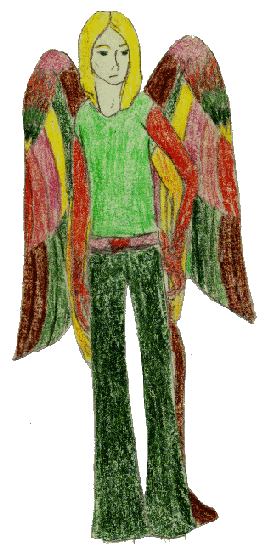
Tribe Seslen --
The smallest build and wing size. Wings are uniformly feathered, and
are usually about 1/2 the distance from head to feet (on a 7’ tall
male, their wings will average around 3-4’ from leading edge to
flight tip). Brightly colored feathers usually descend in a rainbow
from edge to body, and are often dominated by purples, blues and pinks.
Skin color is usually very pale to fair, hair goes from a rich brown
to silvery blond-white. Eye color can be from dark green to pale blue,
never darker. Avian arms’ coloration also spreads to chest and
neck area, the scaley skin for some reason being more apparent on this
tribe -- the colors are often those found on the leading edge of the
wings. Feline arms tend to be either dramatically darker than the avian,
or a shade lighter, but rarely an entirely different color. Seslen tribe
members are usually found in the lower reaches of forested lands, on
farms, and in urban settings -- their wings are not nearly as large
as some (they cannot fly, but some can glide for extremely short distances),
and they have no innate claustrophobia. -- A note -- females outnumber
males in this tribe by three to one.
Ahalo
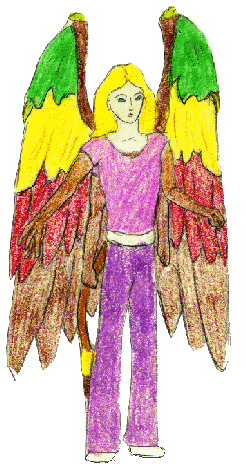
of a medium size, barely bigger and barely distinguished from the Seslen. They share the same basic appearance as the Seslen, generally blond haired and blue eyed, with bright wings. Their wings are larger -- aproximately 3/4 body length, and are distinct by the fact that they have a stiff wrist covered in leathery skin, and a hook-finger at the top and a second just passing the secondary feathers, the feathers are usually 4-5 colors, with the primaries being the largest and all the same color. Also, this tribe has a second color of fur on the tuft of their tail, usually a darker version of the hair, but sometimes a contrasting color. This is a very new tribe, only distinct for about 50 years. They are able to glide for short distances.
Aphern
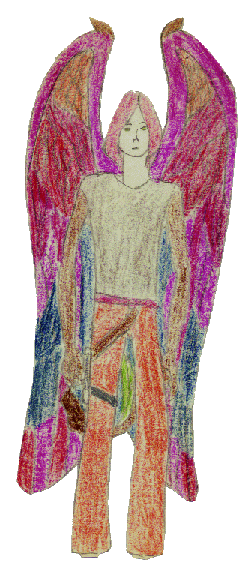
tallest and most slender of the avian-winged Humanoid tribes, Aphern are also usually blond, with red to brown eyes, occasionally green; and fair skinned, but several instances of dominant-gene breeding has led to dark-skinned and black haired versions. The wing size on Aphern is up to 100% of height, occasionally larger. They are able to fly -- hence their slight build. The wrist and leading edge of the wing is a scaley skin, with hook-finger only at the folding wrist. Wrist skin is often the same color as the bright feathers directly beside it. Some primaries have been seen at up to 4 feet in length, and these are usually in many colors. Occasional instances of the chest-coloration have occurred, but are very uncommon. Their arm coloration is often brown, green or dark blue. Females outnumber males by about 1.5 to one, identical (or near-identical) twins are common. Aphern live in tall forest areas, and occasionally in high mountain aeries, open to the air. They are the most curious about human affairs of the K’thari, and often involve themselves in local government or business -- as long as it occurs outside...
Aich'i
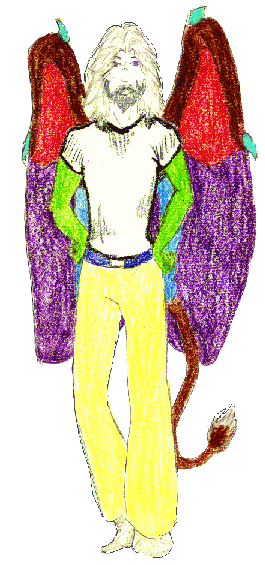
Largest physically and most varied in appearance of the humanoid tribes. With small, heavy leathery wings, they are unable to even glide. The wings are very bat-like in appearance, with two hook-fingers at wrist and primary areas. The wrist-leather color is uniformly brown, but can vary in intensity. Hook color is directly connected to arm coloration. More Aich’i are dark-skinned than light, the lighter are often red-headed, or white-haired. Aich’i are most likely to have different colors of arms. Eye color varies from violet to brown, red and blue, greens and rarely black. Wings are often two striking colors, one in the high fold near the wrist, the other filling out the wing. Aich’i live primarily on flatlands, jungle, and urban settings. They are used to human habitation, and are more likely to join any human ventures.
Chiroko
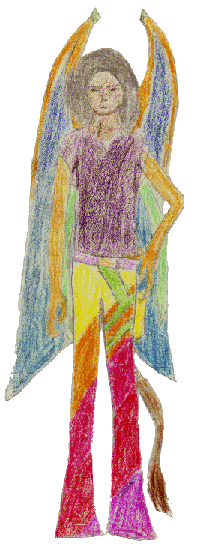
Smaller than the Aich’i, but are a new (within 200 years) version of an intermediate breed. With thinner wrist-bone and only one hook-finger, their wings are often as much as 3/4 height. Wings have two colors. They can glide, but often they weigh too much for the wings to carry them. Most are dark skinned, but few are appearing blond. Eye color is from brown, yellow, green, occasionally red. Wrist color is varied, but still usually brown, orange or yellow. Twins are most common. They are equally as likely to have arms with complimentary colors as contrasting. They are often found in urban settings, and are quick to learn technology, unusual in K’thari.
Daioko
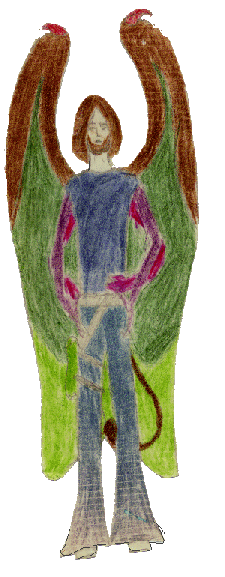
With wings the largest of the leather-winged tribes, Daioko are mostly found in very wet climates, caverns and rainforests. Like the Aich’i their wrist-part of the wing is uniformly brown, they have complimentary colored arms. Their skintone is darkest, with pale or light colors occuring less than 1% of the births. They have two colors on the wings, with the greater part starting beneath the wrist, the smaller color patch is at the edge. Their wings can support short flights, and must be kept moist or well tended. Eye color is red, orange and yellow, with occasional green. Hair on darkest skinned individuals may range a silvery-blue to deep black.
Heli
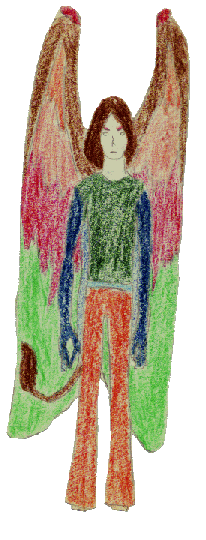
A cross between Aphern and Daioko, the long, leather-tipped wings with feathers down from the wrist, one hook-finger each. Skintone is dark, hair is black to silver and brown, eye color is red and violet. Arm color is always complimentary, and usually dark. Instances of chest coloration exist. This Tribe is less than 100 years old. Wing size is up to 100% height and flight is possible and likely. These individuals are often viewed as outcasts, but make little attempt to fit in in their own tribes. Many of these have left their homeworld.
Apthi
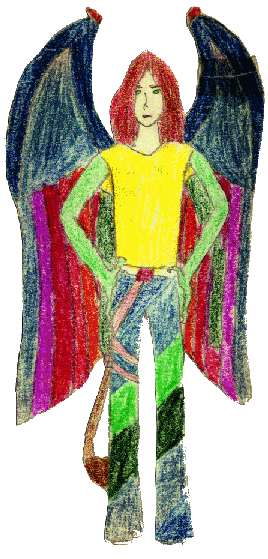
a cross between Aich’i and Seslen, and one of the oldest. Wing size is 1/2 to 3/4 height, giving a gliding ability. These are the most often seen in spaceports, forest and deserts, they’re everywhere. Skintone is generally fair to medium, with hair everywhere from silver to red, to dark brown. Eye color varies considerably. Wings are compact, with the leathery patch being the area beneath the wrist, and feathers covering the lower parts. The feathers are in complimentary shades to the wrist and patch, and are usually very long (as primaries, seemingly without any secondaries or other feathers). Fraternal twins are common.
Leonid
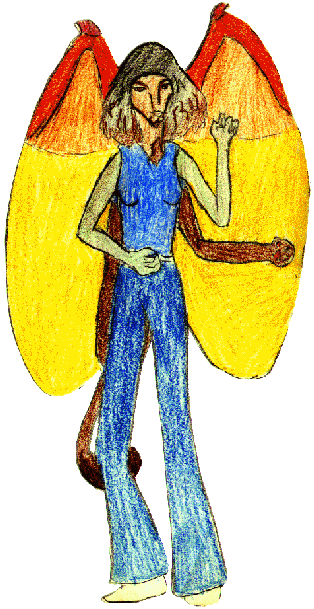
All Leonid tribes have leathery wings similar to Aich’i, with one hook-finger on each. Wings are slightly more than 1/2 height. Leonid characteristics are a muzzled face, with sensitive nose, slightly higher-possitioned ears with some better hearing, whiskers on some wich give vibration sensitivity, slit-pupiled eyes which are very sensitive to light, fur covers all of body and legs, and is heavy on chest up to neck and often in a tuft on collar. Fur is a complimentary shade to the head hair. As opposed to the humanoid version, the Avian arms of the Leonid tribes are far more humanoid, with smaller talons that are often with a single opposing ‘thumb’. The feline arms are heay, with thick pawlike fingers with pads below, fur around the fingers and semi-retractable claws. The Leonid tribes are about 10-15% larger all around than the humanoid races but live only about 10 years longer on average.
Tribe Shakesh -- Lighter furred, generally ranging orange to tan. Hair is caramel red to brown only, eyes can be orange, green or brown. Wings are usually light and range from green to yellow, blue-green and blue. These live in mainly sand desert conditions, and shun human contact.
Tribe Lorrh -- Darker furred, with mostly tan to brown fur. Hair is two-toned, with a darker black or silver shade above, fading to a tan or silvery white below. Eye color can be red, orange or yellow-white. Wing colors are usually yellow, pale green, and pale blue. These live in light forest, hilly areas, and scrub desert.
Avian
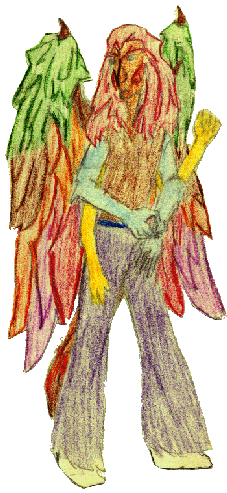
Living exclusively in heavy forest and rainforest, the single remaining tribe of Avian K’thari is dwindling rapidly. They unfortunately do not survive well with pollution and are fearful at best of human or alien contact. They live only around 120 years, and are at most 70% as large as the humanoid race. They are generally of a squat build, but hollow-boned, and their wings while slightly less than 75% height are extremely strong and usually support them on long flights. They have a single very sharp hook finger on the wrist of the wing, and the feathers are usually yellows, greens and browns. Arms are contrasting colors only. The faces of the Avian race are wide, with a sharp, long nose, and a small horizontal mouth. Feathers grow from the cheeks of adults, usually in a color near their head hair. Their eyebrows also are more like feathers than hair. They have feathery down on their legs, which proves uncomfortable for them if they are forced to wear any clothing. Their tails have feathers around the base as well as the tuft of fur, in a brighter color. They are light- to medium skinned, and their feline arms are more humanoid than pawlike. Their talons are often opposed. The avian race has its own language, and they do not tend to learn human concepts well. The birth rate of the Avian race is in such a decline that it is estimated within 100 years the race will be extinct.


